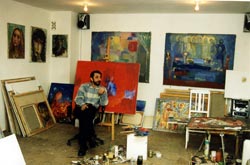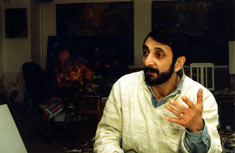 |
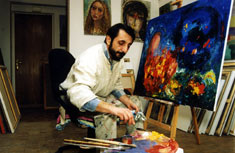 |
 |
 |
Boris Yegiazaryan born in 1956, in the village of Aparan, Armenia.
Studied painting in the Yerevan Art College, later in the Mukhina Art Institute in St. Petersburg. Graduated from the Kyiv Art Academy in 1986.
Since 1986 Boris Yegiazaryan participates in various exhibitions in Armenia, Ukraine, and abroad.
Boris Yegiazaryan's works may be found in the museums and private collections all over the world.
I go to the Central Bessarabka market and buy a pomegranate. The biggest one, beautiful, warm. This is what Boris does when he feels miserable because "the sky is too low over the horizon". This was the reason why he ran away from Petersburg, but still stays with us in Kyiv. Please, stay we are unhappy without you.
Boris is a phenomenon providing us unequivocal happiness. One enters a gallery somewhere in the center of the city and finds a treasure - Yegiazaryan's works (Yegiazaryan is the way the artist signs his works). The surface of his paintings reminds us of an antique enamel. The specks, the purest crystal-clearest dissemination of colours, look like that of the Echmiadzin Gospels.
Boris does not spare his works: he donates them to galleries, displays them at various exhibitions, lends them just for "hanging on the wall for a while", presents and sells them. Thank God, there are many works. Some painters"squeez" their works out for years. Boris paints them passionately, impulsively, with his brush? Palette-knife or just his hand.
Specks and streaks of paint create a wonderful pulsating environment in which one may identify indesribable things! The total Rorschach! Effortless, inspiring as if he was playing.
One who writes in sweat and ploughs in sweat,
We experience quite another zeal…
And above that colourful mess one can see a shape, the only hint of a person. But the sum and substance is not that. It is in some other magic vibration, roughness of the colour. It cannot be obliterated. The roughness, unevenness of a pomegranate, of the rocks. The dawn-tinted rocks of Armenia.
You say the sum and substance is not thet? But yes it is. Who says that Boris is an abstractionist? He is a dreamer, an inventor, an author of touching and serious tales: about a wheel-inventor and his wife; the origin of an artist; angels flying over a city; a red fish listening to the concert…
He is incredibly vivid. He could stay there in the clouds of the eternal colour. But probably consciously he comes down to the people. To the understanding, the subject. He tells simple stories sitting close to the fire.
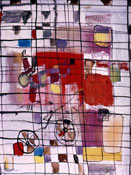 The drawing is almost childish, ephemeral. Boris paints flat, grey asphalt with colourful boxes - and launches this unbelievable "Bicycles of the Childhood" I
The drawing is almost childish, ephemeral. Boris paints flat, grey asphalt with colourful boxes - and launches this unbelievable "Bicycles of the Childhood" I
The boxes like in hopscotch. Yes, hopscotch when one hops on one foot while playing. There is an impression that he is ignorant about what will be the consequence of all that. To plunge into one of his paintings is as if placed into a historical vortex. You know, it is said in Okudzhava's text: "...into the distance of the novel". Klee, an apostle of childishness with Jung's inevitability has reached the breath of the archaic character, archetypes-signs. As far as Boris's works are concerned one may say that an ancient soul of Armenia, direct visual symbols of some unfathomable structures of conscience or subconscious splashed out there. Does the strictness of the classification matter? Thank God Boris is neither a historian, nor a philosopher: he is just an artist.
The drawing is almost childish, ephemeral. Maybe, it is happening right now or was happening long ago. We just perceive the traces of those events that happened long-long ago. So, once Boris saw the outline of something, like a toy on an antique Christian tomb in Ashtarak, and since then paints it everywhere and always as if being charmed. He paints a soul like some mortal body. As you know, there will alwas be "Love", "Music", "Quiet Talk" and even "Long-awaited Travel".
Symbols are just the same: a mother, a child, a father, a pomegranate, an ark; a fish, a bird. But try yourself to paint them the way he does. The motifs are permanently repeated: a concert, a blessing of the new born baby, flight over the city. But one never gets bored. Just like one never gets bored drinking water. He is pure, open, innocent. One will never learn to be that way. As if an ancient blood of some artist is reborn in Boris - he who paints icons and miniatures and breathes canonically. But he did not invent the canons, nor did his teacher or did his teacher's teacher.
Boris is not at all a playful postmodernist who toys with meaning and cultures. He is deeply involved with the only one – his cilture. But it is so infinite.
With his red fish he is immersed in the depth of the infinite blue; with the coarse pomegranate - into the transparent cyan colouf of his miniatures, the cyan colour of the southern sky. This is the reason why he feels so uneasy under our grey sky.
In his hands Boris rotates small pomegranates that have accumulated the sun energy. Then, bent down, hiding himself from the outside world he draws something on small pieces of paper, as if fanning a fire. His own fire "flares up". The paint is just about to flow down - and this grey reality will disappear.
Later these pieces of paper will fly like some birds and will grow into big pictures in Italian frames (Boris, a real son of the Caucasus is fond of doing everything like a person of wide-ranging enterprise), but even now, without the frames they are precious and self-sufficient. Boris, surrounded by his drawings, is like a knight who opened a chest full of treasures.
What do you say about this chest? He draws as if grants. There is a movie about Picasso later in his life where he sits in his shorts, mighty, with large eyes, and draws. The camera is on the opposite side - the shape magically "shows through," as if being born. Boris draws a line in the same manner, with the only possible straightness of the music he heard.
I would gather all those who have tired of their lives in one place, like in a summer cinema from our childhood. I would put them in front of a vast screen-canvas, and Boris would paint for them a tale about happiness, a tale where everything is possible, that music is eternal, that...
Words are useless when a line is applied as a wonderful melody or harmony; when a colour flashes up with some joy; when a fish interweaves in some magic way with a bird, and a golden tree trembles with gaiety.
Boris is fascinated with symbols that arise from under his hand. As if it is not he who moves his brush. Or maybe it is not?
He does not deliberate, he just reads the Gospel, his face becomes brighter and glance clearer. In the crowd of grey, bewildered, aggressive people who hide their aggression, he is like a stranger, the last of Bradbery's aliens from Mars.
He will approach you - and you will be taken aback. He will look at you kindly, with his immeasurably ancient, sad eyes - and smile tenderly. He will sit down and draw something, perhaps your soul flying. You will fly, not the way he draws, but nevertheless you will fly. And you will believe that your soul really exists, and you will experience it. If there are people in this wild, pragmatic world who commission their portraits to Yegiazaryan, it means that something is still maintained. And a branch " full of flowers and leaves" will whisper, and "the first one you meet" will smile back to you.
He will approach you, a person born in a village named Aparan located high in the mountains. He walks, breathes, draws with some primordial, kingly dignity.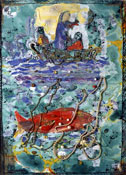 He wears his black overcoat like a mantle, like a cloak of some magician. He passes you by - and everybody starts smiling, their faces become bright 1 As if he secretly scatters some pearls .He throws his pearls - and a moment later they already sparkle like some mysterious celestial bodies, hanging down like precious chains. Boris likes collages. His speech is guttural with stressed 'o' He is open in following Paradzhanov.
He wears his black overcoat like a mantle, like a cloak of some magician. He passes you by - and everybody starts smiling, their faces become bright 1 As if he secretly scatters some pearls .He throws his pearls - and a moment later they already sparkle like some mysterious celestial bodies, hanging down like precious chains. Boris likes collages. His speech is guttural with stressed 'o' He is open in following Paradzhanov.
"Why should I conceal it? On the contrary, I dedicate all that to him." One feels dizzy looking at his paintings: the space of Boris's sensual, impulsive paintings, and the space of real objects continuously interweave with each other and refract. It is not enough just to see them. One would like to touch them like a child, to go around them.
Sometimes there is an urge even to steal, to tear something away just like a keepsake. What, do you think Paradzhanov would object to that?
Well, in general, Boris is unselfish, and generous, and... which way is it better to say... versatile. He creates such a joyful "colour" sculpture - Matisse would smile: flowers, flexible springs running directly down the body, pubes like an orchard in blossom - and a bird that carries a bough!
He is a total artist. Put him into a jail - and after several years he will turn it into the Hundertwasser City of Happiness. God bless us, but are not we in a jail? Do not we really need those who would open for us windows into the boundless sky?
Let us take care of them, tend and cherish them, publish their catalogues, arrange their exhibitions, etc., etc. While they are with us.
But Boris does not need any consolation, and what does it mean "while they are with us". "I'll depart, someone else will come." Boris reverberates like some quiet, hardly heard melody of Matenadaran. Or maybe something greater - the mountains, the sky or a pomegranate. And again he spreads out pieces of paper and draws something. Boris likes to draw with golden colour. These are the trigrams of the eternity.
He also likes to present gifts, to kindle fire, to help, to protect, even to fight - when it is required.
He is a real king.
Aleksey Titarenko
